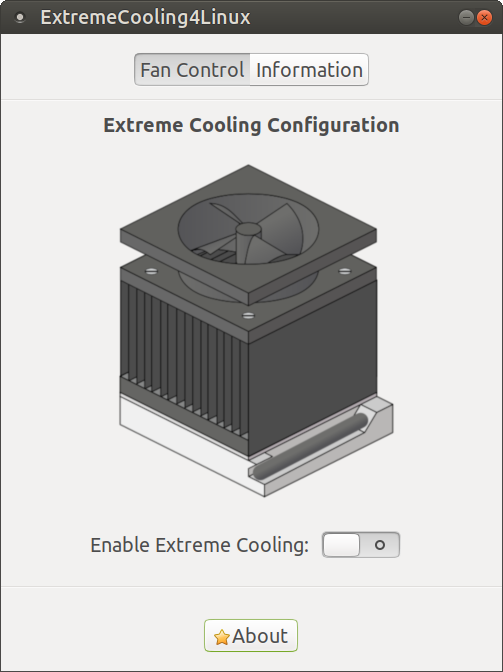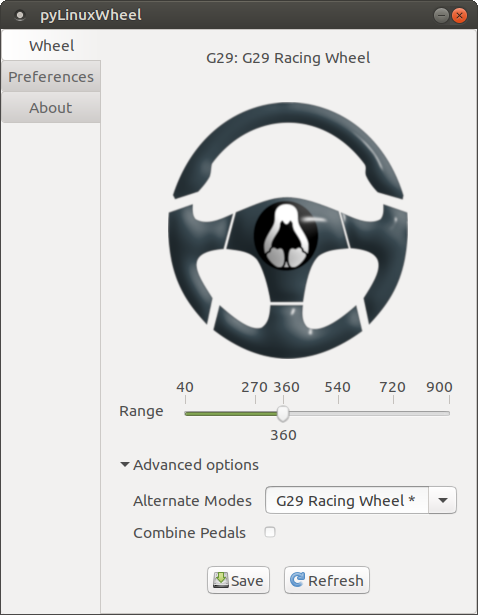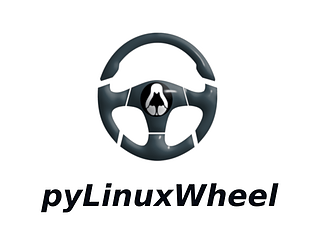Open an issue in gitlab with the logs of the execution of the program.
odintdh
Creator of
Recent community posts
Hello
to install a deb package it needs to have its dependencies in the repositories definid in the /etc/apt/sources.list file or inside /etc/apt/sources.list.d/ directory, so Gdebi can't search dependencies from pip.
Ubuntu 20.04 has python3-portio package in the universe repository. Debian Buster also has python3-portio in its repositories. If you don't have pytho3-portio I guess that you are using a distribution older than Ubuntu 20.04 or Debian Buster. If you can't update your distribution you always can use the ExtremeCooling4Linux AppImage version that is packaged with all its dependencies.
Hello
I use Ubuntu Mate 20.10 and I have reinstalled the deb version but it works properly, so I can't reproduce your problem.
Could you execute ExtremeCooling4Linux from the terminal with the command ec4Linux and show me the traces?
On the other hand if you have enabled Secure boot recently, disable it because it can interfere in the correct execution of the program.
Hello
To configure your steering wheel you have to set your desired values in the "Wheel" tab. "Test" tab is only to check if your wheel is working properly. Execute button from Test tab is only to test force feedback and it does not activate nor deactivate it. Force feedback support and other features are provided by the kernel driver.
PyLinuxWheel can set values as autocenter (resistance), gain, range, which are provided by the kernel driver and you don't have to install any driver as is included it by default.
new-lg4ff is a more advanced driver than the included in the kernel. Some windows games emulated with proton works better with new-lg4ff as it supports more force feedback effects. So new-lg4ff is a very good driver and better than default kernel driver, but it is not mandatory to install it to have support for your steering wheel.
Did you let to pyLinuxWheel install the udev rules for your steering wheel? pyLinuxwheel could show "Unsuported model" message if you don't have the udev rules installed for your wheel or if your kernel is too old to detect and support your model.
pyLinuxWheel install these rules at the begining of the execution but only if you give it permission. Other possibility is execute pyLinuxwheel with sudo.
Check if you have the udev rules properly installed, and check if Linux is detecting you steering wheel (you can use the lsusb command for this).If these two things are ok, but pyLinuxWheel does not work, open an issue in my gitlab page with the output of the pyLinuxWheel and the lsusb command.
On the other hand take in account that Ubuntu 16.04 is an old distribution and therefore with an old kernel. So you can have problems with your steering wheel that with a newer version could be fixed, as you can read for example in articles like this
Hello
If you can't install the udev rules you can execute pyLinuxWheel with sudo or root to give to pyLinuxWheel the enough privileges to configure Logitech driver.
Also you can manually install the udev rules to avoid use sudo or root to execute pyLinuxWheel. Download the udev rules from this link 99-logitech-wheel-perms.rules and copy to the rules directory using this command sudo cp 99-logitech-wheel-perms.rules /etc/udev/rules.d/
When you have finished the copy you have to update udev rules with sudo udevadm control --reload-rules && udevadm trigger
If you follow these instructions you will have the udev rules installed and activated, so you will can use pyLinuxWheel without sudo or root.
Hello
Thanks for your comment!
Could you open an issue in my gitlab with the following information:
- the output of the lsusb command
- the button clicked number that pyLinuxWheel shows in its Test tab when you push your throttle and brake pedals
- the output of evtest command
To know how to use lsusb and evtest to get the information of your steering wheel you can follow this guide from the arch wiki
Hello
thanks for your comment!
I made a new version to fix the problem with the pedals values (it was an error in how the values are stored and calculated) . Now you can press throttle and clutch pedals and get 100, but depending on the hardness of the pedals of your steering wheel you may not get the maximum value (100). For example I never get 100 with the brake pedal in my Logitech G29 but I get easy 100 in clutch and throttle pedals.
On the other hand, about your problem with project cars 2. I don't have this game, but I think the force feedback with proton does not work in project cars 2 as there is an issue about force feedback for this game in the proton github. I have project cars 1 and force feedback works properly but keep in mind that PyLinuxWheel is not a driver for Logitech wheels. PyLinuxWheel is only a program to configures the values of the Logitech kernel driver. So the support of your steering wheel in a game with proton depends on proton and the kernel driver.
Hello!
Before to create a new release I have been study how to package PyLinuxWheel with snap and flatpak. The problem is PyLinuxWheel needs to write in the sys interface to configure the steering wheel. In flatpak this is not possible due to the sandbox design and with snap, only is possible if I use the classic confinement, but in this mode you need a manual approval to publish in the snapstore.
So in the end, for this release, I tried to create a more compatible AppImage. If you have a problem executing this new appimage, please, open an issue in my gitlab repository so I can fix it.
Hello Linux users!
Lenovo Extreme Cooling is a special fan mode that you can activate in Lenovo Nerve Center but this program only works on Windows. I have a Lenovo Legion Y520 laptop, so I created a Gtk3 program to enable Extreme Cooling on Linux.
You can download from https://odintdh.itch.io/extremecooling4linux

Hello Linux gamers!
If you have a Logitech Steering Wheel and you are a Linux user then I have an open source program that can be useful for you. PyLinuxWheel is a graphical program developed in gtk3 to configure your Logitech Steering Wheel in Linux. You can read its features and download from https://odintdh.itch.io/pylinuxwheel




